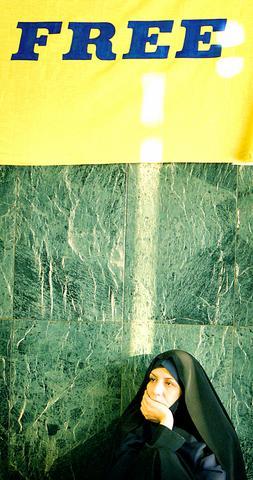On Wednesday Iran's provincial governors escalated the confrontation over who can run in next month's elections by declaring they would not allow polling in their areas unless most of the disqualifications are overturned.
"All provincial governors have announced unanimously that, under present circumstances, there will be no possibility of holding elections," Interior Ministry spokesman Jahanbakhsh Khanjani said.
While Iran's supreme leader, Ayatollah Ali Khamenei, has the authority to overrule the governors, their declaration suggests that if the hard-liners responsible for the disqualifications do not back down, they will have to resort to extraordinary measures to hold the legislative elections on Feb. 20.

PHOTO: REUTERS
The hard-line Guardian Council has disqualified more than a third of the 8,200 candidates -- including more than 80 sitting lawmakers. The move has triggered Iran's biggest political crisis in years, with reformers accusing conservatives of trying to skewer the elections.
Khanjani said the governors made the decision at a meeting in Tehran that ended on Wednesday night.
Earlier Wednesday, Iran's largest group of pro-reform students urged people to boycott next month's elections in protest against the disqualifications. It was the first time any political group had called for a boycott since the crisis erupted.
Iranian President Mohammad Khatami tried to head off a boycott of the legislative elections on Feb. 20, telling reporters he would strive to reverse the disqualifications down to the last unfairly treated candidate.
"There is no possibility of fair and free elections," the student movement, the Office for Fostering Unity, said in a statement carried on the official Islamic Republic News Agency (IRNA).
"Considering that people's votes have no affect on the establishment, and there is no way to hold fair and free elections, there is no justification for people to participate in this election," the students said in their statement.
The students praised the reformist lawmakers who have been staging sit-in protests in the parliament building since the disqualifications were announced earlier this month.
Khatami set aside earlier hints that he might resign over the affair and pledged to work both to reinstate the candidates and to defend the reform program that hard-liners have largely succeeded in blocking.
"Even if one person has been disqualified unfairly, as the president, I will defend his right," Khatami said Wednesday.
Appearing more confident than he has been in recent weeks, Khatami said: "If somebody is a thief, or is a drug smuggler or documents prove he has worked to overthrow the establishment, he is not qualified to run. But all those disqualified were so? ... Many of those disqualified deserve to run."
The Guardian Council has reinstated more than 700 candidates, Khatami said. "Based on our talks, this figure is set to rise," he added.
Iran's chief of elections, Deputy Interior Minister Morteza Moballegh, criticized the Guardian Council on Wednesday, accusing them of taking too long to review the disqualifications in a more sympathetic light, as Khamenei has urged them to do.
"Not even one prominent person or lawmaker is among those reinstated. The trend of reinstatements is not convincing," Moballegh said.
"If only a few disqualified persons are to be reinstated, we won't hold elections," Moballegh said.

Auschwitz survivor Eva Schloss, the stepsister of teenage diarist Anne Frank and a tireless educator about the horrors of the Holocaust, has died. She was 96. The Anne Frank Trust UK, of which Schloss was honorary president, said she died on Saturday in London, where she lived. Britain’s King Charles III said he was “privileged and proud” to have known Schloss, who cofounded the charitable trust to help young people challenge prejudice. “The horrors that she endured as a young woman are impossible to comprehend and yet she devoted the rest of her life to overcoming hatred and prejudice, promoting kindness, courage, understanding

Tens of thousands of Filipino Catholics yesterday twirled white cloths and chanted “Viva, viva,” as a centuries-old statue of Jesus Christ was paraded through the streets of Manila in the nation’s biggest annual religious event. The day-long procession began before dawn, with barefoot volunteers pulling the heavy carriage through narrow streets where the devout waited in hopes of touching the icon, believed to hold miraculous powers. Thousands of police were deployed to manage crowds that officials believe could number in the millions by the time the statue reaches its home in central Manila’s Quiapo church around midnight. More than 800 people had sought

‘DISRESPECTFUL’: Katie Miller, the wife of Trump’s most influential adviser, drew ire by posting an image of Greenland in the colors of the US flag, captioning it ‘SOON’ US President Donald Trump on Sunday doubled down on his claim that Greenland should become part of the US, despite calls by the Danish prime minister to stop “threatening” the territory. Washington’s military intervention in Venezuela has reignited fears for Greenland, which Trump has repeatedly said he wants to annex, given its strategic location in the arctic. While aboard Air Force One en route to Washington, Trump reiterated the goal. “We need Greenland from the standpoint of national security, and Denmark is not going to be able to do it,” he said in response to a reporter’s question. “We’ll worry about Greenland in

PERILOUS JOURNEY: Over just a matter of days last month, about 1,600 Afghans who were at risk of perishing due to the cold weather were rescued in the mountains Habibullah set off from his home in western Afghanistan determined to find work in Iran, only for the 15-year-old to freeze to death while walking across the mountainous frontier. “He was forced to go, to bring food for the family,” his mother, Mah Jan, said at her mud home in Ghunjan village. “We have no food to eat, we have no clothes to wear. The house in which I live has no electricity, no water. I have no proper window, nothing to burn for heating,” she added, clutching a photograph of her son. Habibullah was one of at least 18 migrants who died